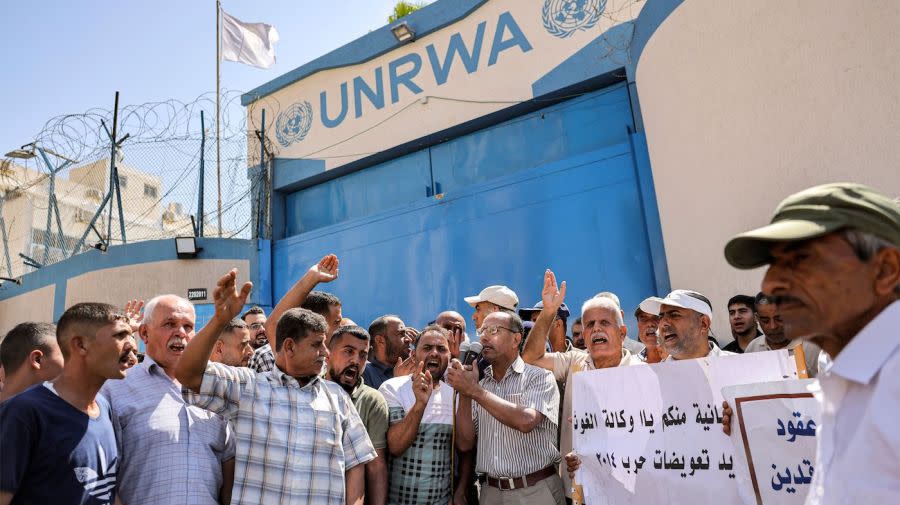Independent report does not find UN’s Palestinian agency is compromised by outside groups

A highly anticipated independent report did not find the United Nations Relief and Works Agency for Palestine Refugees in the Near East (UNRWA) is compromised by outside groups or has a systemic neutrality failure, a point of major contention after Israel accused 12 staffers at the agency of participating in the Oct. 7 Hamas attacks.
The report from an independent group appointed by the United Nations in February and led by former French Foreign Affairs Minister Catherine Colonna determined UNRWA has “a significant number of mechanisms and procedures to ensure compliance with the humanitarian principles.”
The report notes there is an “emphasis on the principle of neutrality” and that UNRWA “possesses a more developed approach to neutrality than other similar UN or NGO entities.”
Colonna said at a U.N. press briefing Monday that there is “room for improvement” and some neutrality issues persist, but overall she found that the mechanisms at UNRWA are “elaborate.”
“Now what needs to be improved will be improved,” she said. “I would strongly encourage the international community to [stand] side-by-side with the agency so it can perform its mission and overcome the challenges when they are there.”
U.N. Secretary-General António Guterres said in a statement that he “accepts the recommendations” provided by the independent report.
“Moving forward, the Secretary-General appeals to all stakeholders to actively support UNRWA, as it is a lifeline for Palestine refugees in the region,” he said.
The report contradicts claims from Israel that UNRWA is compromised by Hamas and other Palestinian terrorist groups. Israel accused 12 staff members of working with Hamas and claimed 10 percent of the 32,000-member agency had ties to the militant group.
UNRWA provides critical relief to Gaza, and the backlash over allegedly supporting Hamas led to 16 countries cutting off aid to the agency, including the U.S. and European allies. Some of those countries, but not the U.S., have reinstated funding for UNRWA.
Colonna worked with the Raoul Wallenberg Institute in Sweden, the Chr. Michelsen Institute in Norway and the Danish Institute for Human Rights in the report.
The group released interim findings in March that detailed mechanisms and procedures in place to ensure neutrality.
The U.N. has a separate inquiry into the allegations of the 12 UNRWA staffers who allegedly worked with Hamas on Oct. 7, when Palestinian militant fighters invaded southern Israel and killed some 1,200 people and took 250 hostages.
The Colonna report looked at whether UNRWA has a systemic problem compromising its neutrality, and investigated this by reviewing the agency’s management and operations.
The report shows UNRWA has teams, policies and training in place to ensure neutrality compliance and requires reports of misconduct to be filed.
Historically, around 21 allegations have been filed against UNRWA each year, but since the Oct. 7 attacks that number has soared, with 151 allegations between January 2022 and February 2024.
Allegations of misconduct largely relate to social media posts and are reported by those outside UNRWA, according to the report, which found a “clear capacity challenge” for the agency to manage the claims with available staff and resources.
The Colonna report looked at two studies reviewing textbooks from the Palestinian Authority, which governs the West Bank and provides books to Palestinians in Gaza. The books are provided in UNRWA schools as well.
Those reviews showed the educational books have biases, but they do not contain antisemitic content, according to the Colonna report. One review found antisemitic content but found the details in question were later changed.
Still, nearly 4 percent of textbooks at UNRWA schools do not align with U.N. standards or are educationally inappropriate, the Colonna report said, citing a UNRWA study that found references to maps that do not contain Israel or refer to Israelis as Zionists, an often derogatory term for the country’s people.
Authors of the report called that a “grave violation of neutrality” but noted that UNRWA is working to fix the issue.
“UNRWA has made significant progress in the past few years to mitigate the risks attached to the promotion of hate and the incitation of violence in textbooks and in the classroom,” the report said.
The Colonna report also noted that UNRWA staff does struggle with “increased politicization” but noted there is a robust system of vetting and training to ensure neutrality. Some UNRWA facilities have also been misused for political or military purposes, and Colonna called for more inspections of these sites.
For the latest news, weather, sports, and streaming video, head to The Hill.

